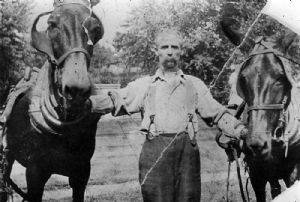Collection Name
About
Mr. Wesley: Now, you said earlier that your mother seldom took a trip on the boat. She just kept house in Sharpsburg?
Mrs. Schroeder: Yeah, and raised the other children and kept most of them in school. She'd go once in a while. You see, she's on here now.
Mr. Wesley: Oh, in that picture.
Mrs. Schroeder: Yeah, here's my mother. Here's her wash tub where she's washing and —
Mr. Wesley: Is that the whole family in the picture?
Mrs. Schroeder: No, that's not my — this is one of my sisters and this is one of my sisters and this one and my mother and my father and my brother and a couple of them not born on there, there's two, three, four, five — there's five of us on there.
But, she'd go once in a while. Not as much as we stayed on there. You see where she's got part of her clothes hanging and then we had we had a line we'd stretch and mother would hang her clothes up.
Mr. Wesley: The line would stretch from the bow back to the stern cabin.
Mrs. Schroeder: Yeah, and she'd hang her clothes up.
Mr. Wesley: I've seen a lot of pictures you know of boats with the wash hanging out on a line.
I imagine she probably would take maybe, when you made your last trip in the fall, she'd go down with you to stock up on things?
Mrs. Schroeder Yeah, we'd stock up on four and sugar and coffee and shoes. My father would buy shoes and, oh, I don't know what all. Clothes, in the fall. And my father didn't work anymore then, we didn't work in the wintertime. We'd stock up enough that we'd have, run till the next spring.
Mr. Wesley: So you'd stock up down in Georgetown?
Mrs. Schroeder: Georgetown or in Cumberland. Whatever we wanted to get and we'd always have — and then my father always had his own hogs and we had chickens and we'd have enough to run us then until — we weren’t rich, we were just poor people and we had a nice home.
Mr. Wesley: You layed over what, from about the middle of November to March?
Mrs. Schroeder: Yeah.
Mr. Wesley: And so, during that, what did you do with your boat during that time?
Mrs. Schroeder: Just stayed out there at Snyder's Landing.
Mr. Wesley: He just left it out in the canal?
Mrs. Schroeder: Just drawed the water out of it and left it set right in the bottom of the canal. Nobody bothered them. Everybody's boats were out there that boated.
Mr. Wesley: So they'd just sit there until the water —
Mrs. Schroeder: Come back in.
Mr. Wesley: I imagine in March, everybody was —
Mrs. Schroeder: Oh, everybody would get out there, we'd get out there and clean up the cabins and scrubbing and get everything ready.
Mr. Wesley: After sitting around all winter, I imagine a lot of the boatmen would look forward to the water coming in.
Mrs. Schroeder: Their mules, they kept their mules up, I don't know whether Riley ever told you that or not, they kept their mules up at Four Locks. Did he ever tell you that?
Mr. Wesley: At Hassett's?
Mrs. Schroeder: Yeah. There's where they kept their mules. They'd take their mules up there and they'd drive them up, just ride them up, and then somebody would go up there and get them. That's where they always kept their mules at.
Mr. Wesley: So, like your father would leave the boat in the canal at Snyder's Landing and just take his mules and drive them up the tow path —
Mrs. Schroeder: No, no. I don't know how they did, I don't think though, I think they went up the back - up the back road.
Mr. Wesley: Up the back road. To Hassett's?
Mrs. Schroeder: Yeah.
Mr. Wesley: And he had a big feed place.
Mrs. Schroeder: Well, he kept all the company mules, see. The Canal Company paid for those.
Mr. Wesley: How did you know, in the spring, did the Canal Company let you know when the water was coming in again, or —
Mrs. Schroeder: Oh, they knowed. The boatsmen knew when they was supposed to go.
Mr. Wesley: They knew.
Mrs. Schroeder: Yeah.
Mr. Wesley: So, they'd have everything all hooked up and ready to go. And then up to Cumberland, you'd go.
I guess they would have to go and pick the mules up first at Hassett's.
Mrs. Schroeder: And then a lot of times in the spring, -then they'd go up there, they had a dock up there where they built boats. Well, the boats would need repair and they'd go up there to the dock and get fixed, or get caulked, a lot of them would need caulking, — -they'd dried out and they would caulk them and pull them out on the docks up there, they would do them just like you do —
Mr. Wesley: Pull them up on dry-dock.
Mrs. Schroeder: Just ride them up on the dock.
Mr. Wesley: And they would get them all caulked before they started.
Mrs. Schroeder: Yeah, painted and a lot of them needed it, some of them didn't need it.
Mr. Wesley: Did they, you said painted. Did they paint the cabins or —
Mrs. Schroeder: Oh, these here, whatever they needed. Mostly creosoted.
Mr. Wesley: Creosoted the hull?
Mrs. Schroeder: The hull, yeah. That's what they done there.
Mr. Wesley: And then they painted the cabins and shutters?
Mrs. Schroeder: Yeah, the sides.
Mr. Wesley: But the hulls of the boats were never really painted, were they?
Mrs. Schroeder: No, they were creosoted. After they caulked them, they creosoted them.
Photograph from the collection of the National Park Service (misc 43-7)
